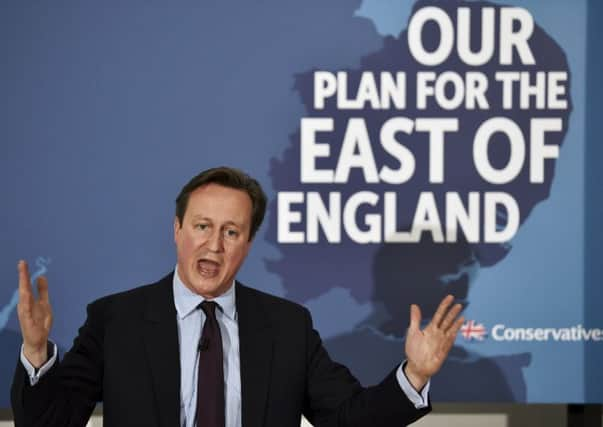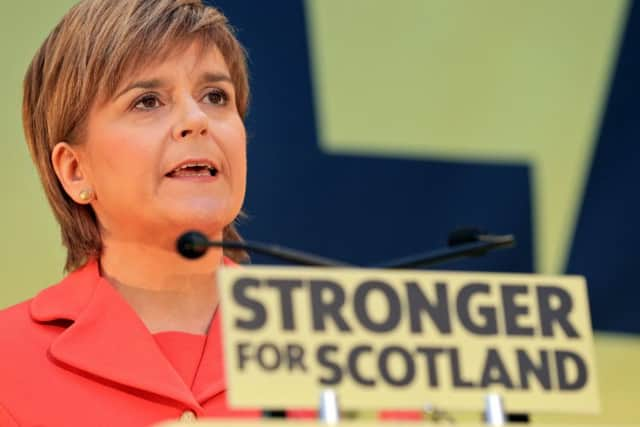David Cameron vow on English only votes under fire


The Conservatives launched a manifesto for England yesterday setting out the plan to give English MPs the final say on income tax rates south of the Border, in response to the devolution of tax-raising powers to Scotland.
Mr Cameron pledged an “English rate of income tax” – although it could apply in Wales and Northern Ireland – once more powers are devolved to Scotland.
Advertisement
Hide AdAdvertisement
Hide AdHowever, the Prime Minister was accused of attempting to “gerrymander” changes to the devolution settlement and of wanting to cut Scottish MPs out of the UK Budget, with his plan to give MPs for English seats a veto on issues which only affect England.


The SNP, Labour and the Liberal Democrats launched separate attacks on Mr Cameron’s English votes for English laws (Evel) plan in a rare display of unity in the Scottish Parliament against the Conservatives.
Under the Conservatives’ proposals, the line-by-line scrutiny of new bills would be reserved for MPs from the nations affected by the legislation.
A new grand committee of all English MPs – or English and Welsh MPs where appropriate – would also have to approve any legislation relating only to England.
Mr Cameron said that, unless the current rules are changed: “English MPs will be unable to vote on the income tax paid by people in Aberdeen and Edinburgh, while Scottish MPs are able to vote on the tax you pay in Birmingham or Canterbury or Leeds.
“It is simply unfair. And with English votes for English laws, we will put it right,” he stated at the launch of the party’s first ever English manifesto in Lincolnshire yesterday.
However, Mr Cameron was accused of a direct breach of the post-referendum promise of more powers for Scotland, after he pledged to introduce firm proposals on Evel within 100 days of forming a government, which would be “fully implemented” by the time of the Budget in March 2016.
Nicola Sturgeon said that Mr Cameron’s plan was breaching both the spirit and letter of the Smith process, with the SNP leader concerned that restricting the voting rights of Scottish MPs diminishes their status at Westminster.
Advertisement
Hide AdAdvertisement
Hide AdThe SNP says that the Smith Commission proposals, which will see power to set Scotland’s own income tax rates and bands – and Air Passenger Duty rates – devolved to Holyrood were originally made without any qualifications and that Mr Cameron was now attempting to move the goalposts.
Ms Sturgeon said: “What he is announcing today is firstly a direct breach of the Smith Commission proposals.
“I think people across Scotland will be listening to what the Prime Minister is saying now and contrasting that with what the Prime Minister said during the referendum campaign.
“Back then, it was ‘Scotland’s got a right to make its voice heard in the UK, Scotland should seek to lead the UK, not leave the UK’, now it’s, well, that only counts if we do what he wants us to do and vote how he wants us to vote.”
Ms Sturgeon, speaking on a visit to a children’s workshop in Glasgow, said that decisions taken in English-only votes such as NHS spending south of the Border would impact on Scotland’s budget due to the Barnett formula, which is used to distribute cash across the UK.
She added: “I’ve made clear on a number of occasions that if there are matters that are genuinely English only, that have no impact in Scotland, I think there’s a strong case for Scottish MPs not voting on them.
“The problem is there’s a lot of issues characterised as ‘English-only’ issues that are anything but – matters relating to the English health service for example.
“Decisions taken on that have a direct impact on Scotland’s budget.”
Advertisement
Hide AdAdvertisement
Hide AdScottish Labour leader Jim Murphy said the Conservative plan would lead to the break up of the UK income tax system and would mean “full fiscal autonomy for England”, along similar lines to the demand from the SNP for full taxation powers for Holyrood.
He said: “The Tory party manifesto revealed their commitment to breaking up UK income tax.
“This is an absolute breach of the agreement they made in the Smith Commission. It is the Tories’ own plan for full fiscal autonomy for England.
“Scotland is now in danger of being caught in a classic pincer movement between a Tory party that wants to cut Scotland out of the UK Budget and the SNP that wants to cut Scotland out of UK taxes.”
Scottish Liberal Democrat leader Willie Rennie accused Mr Cameron of pursuing “unstable and reckless reforms” that would undermine the future of the UK.
Mr Rennie said: “We will not entertain a Conservative attempt to gerrymander those votes in order to give the Conservatives a majority say on these important matters when they don’t command a majority of peoples’ votes in England.”
However, the Conservatives insisted that all MPs, including those representing Scottish constituencies, will continue to vote on the UK Budget and on other key areas such as income tax on savings and dividends.
Scottish Conservative leader Ruth Davidson said English-only income tax “completely fits in” with the Smith Commission process, which her party signed-up to.
Advertisement
Hide AdAdvertisement
Hide Ad“All MPs, including Scottish MPs, will vote on the Budget, and on the united areas of income tax such as the personal allowance, such as income tax on savings and dividends”, Ms Davidson said.
Mr Cameron said changing the rules to introduce “English votes for English laws” was not an easy thing to do, but said the “real threat” was not acting as more powers were devolved to Holyrood.
He said: “Because, if you have basic constitutional unfairness like we’ve had, if you have the people in one part of the UK feeling like they are getting a raw deal, then resentment festers, and that undermines the bonds and the fellow-feeling that are the basis of the United Kingdom.”
Mr Cameron, standing alongside Foreign Secretary William Hague, insisted that the policy “isn’t some purist, over-neat solution that ends up creating more problems in the long run”.
Mr Hague, also dismissed Ms Sturgeon’s claims, stating: “It doesn’t contravene [the Smith Commission] at all.
“All MPs would continue to vote on and discuss all matters that come before the House of Commons.
“All we’re saying is that if something only effects England then in addition of being discussed in the whole of the House of Commons, to come into law, it has to have the approval specifically of the English MPs, or the English and Welsh MPs.”